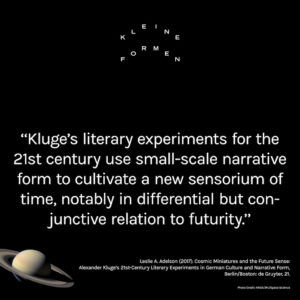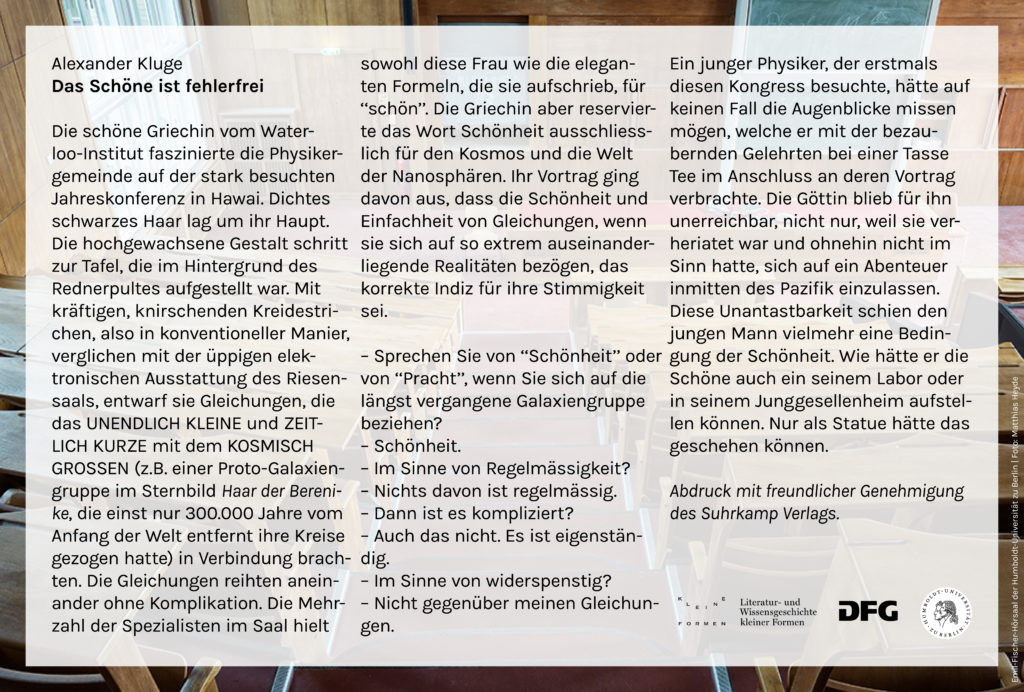“Kluge Is Always Looking for the Chink in the Wall of Historical Catastrophe”
In dieser Episode
English
Ob Außerirdische, die dem Weißen Haus einen unverhofften Besuch abstatten; mathematische Gleichungen, die Verbindungen stiften zwischen der Nanosphäre und dem unendlichen Weltall; ob Anspielungen auf Kants „bestirnten Himmel“ über uns oder astronomische Referenzen – Motive des Kosmischen sind omnipräsent im literarischem Werk von Alexander Kluge. German Studies-Professorin Leslie Adelson (Cornell University) hat ihnen ein ganzes Buch gewidmet: Cosmic Miniatures and the Future Sense: Alexander Kluge’s 21st-Century Literary Experiments in German Culture and Narrative Form (2017). Darin zeigt sie, dass und wie die Fokussierung auf Größenverhältnisse neue Perspektiven auf das Werk dieser so gewichtigen Stimme der deutschen Nachkriegsliteratur eröffnen kann. Ein Gespräch über die Faszinationskraft Alexander Kluges, die Katastrophentauglichkeit kleiner Formen und die Notwendigkeit von Hoffnung in finsterer Zeit.
Der Abdruck und die Lesung des Kluge-Textes „Das Schöne ist fehlerfrei“ (2003) erfolgt mit freundlicher Genehmigung des Suhrkamp-Verlags.
In this Episode
Whether extraterrestrials, paying a visit to the White House; mathematical equations connecting the nanosphere to the endless universe; allusions to Immanuel Kant’s “starry sky” above us or astronomical references—motifs of the cosmos are ubiquitous in the literary work of German author, curator, and filmmaker Alexander Kluge (*1932). In her book, Cosmic Miniatures and the Future Sense, Cornell Professor Leslie Adelson traces these phenomena in Kluge’s 21st-century literary experiments. Adelson shows how focusing on relations of scale can open up new perspectives on the work of this important voice in contemporary German literature. A conversation about her fascination with Alexander Kluge, the resilience of small forms, and the necessity of hope in dark times.
Further Information and Acknowledgments
From October 11-13, 2018, Leslie Adelson presided over the international conference “Alexander Kluge: New Perspectives on Creative Arts and Critical Practice” at Cornell University. Most of the talks delivered at the A.D. White House are available on Cornell’s Video on Demand channel. Scholarly publications based on the conference proceedings are forthcoming in the Alexander Kluge-Jahrbuch (December 2019) and New German Critique (February 2020). Both journals will include new essayistic reflections by Alexander Kluge on “the poetic power of theory.”
Special thanks to Cornell’s Language Resource Center, in particular to Media Development Manager Sam Lupowitz, who supervised the recording. The Resource Center also produces the Speaking of Language podcast, which, in this season, highlights indigenous languages.
The interviewer, microform editor Florenz Gilly, owes a great deal to Cornell graduate student Juan-Jacques Aupiais, who was willing to proof-read the script the night before the interview. At the Kluge conference, Juan-Jacques delivered a talk on “Kluge’s Parallel Globalizations.” You can watch it here.
Thanks also to Arne Sander, graduate student at New York University, who contributed the sound design of this episode.
We encourage you to quote from the interview, using the following format: “Kluge Is Always Looking for the Chink in the Wall of Historical Catastrophe:” Interview with Leslie Adelson. microform: Podcast of the Graduiertenkolleg“Literary and Epistemic History of Small Forms”, URL: www.kleine-formen.de/interview-with-leslie-adelson 2024, Berlin, 2019.
Questions? Thoughts? Comments? Please contact us! Our e-mail address is microform.podcast.idl@hu-berlin.de.
Bibliography
Works by Leslie A. Adelson (Selection)
C osmic Miniatures and the Future Sense: Alexander Kluge’s 21st-Century Literary Experiments in German Culture and Narrative Form, Berlin/Boston: de Gruyter, 2017.
osmic Miniatures and the Future Sense: Alexander Kluge’s 21st-Century Literary Experiments in German Culture and Narrative Form, Berlin/Boston: de Gruyter, 2017.
“Horizons of Hope: Alexander Kluge’s Cosmic Miniatures and Walter Benjamin.” Gegenwartsliteratur: Ein germanistisches Jahrbuch 13(2014), 203-225.
“The Future of Futurity: Alexander Kluge and Yoko Tawada.” The Germanic Review 86.3 (2011), 153-184.
The Turkish Turn in Contemporary German Literature: Toward a New Critical Grammar of Migration. New York: Palgrave Macmillan, 2005.
The Cultural After-Life of East Germany: New Transnational Perspectives. Ed. Leslie A. Adelson. Helen & Harry Gray Humanities Program Series 13. Washington, D.C.: American Institute for Contemporary German Studies, 2002.
Making Bodies, Making History: Feminism and German Identity.Lincoln: University of Nebraska Press, 1993.
Crisis of Subjectivity: Botho Strauß’s Challenge to West German Prose of the 1970s. Amersterdam: Rodopi, 1984.
Works by Alexander Kluge (Only Those Discussed)
„Das Schöne ist fehlerfrei.“ Tür an Tür mit einem anderen Leben: 350 neue Geschichten, Frankfurt: Suhrkamp, 2006, 34-35.
Die Lücke, die der Teufel läßt: Im Umfeld des neuen Jahrhunderts, Frankfurt: Suhrkamp, 2003.
(with Oskar Negt) Geschichte und Eigensinn, 3 volumes, Frankfurt: Suhrkamp, 1993.
Wer ein Wort des Trostes spricht, ist ein Verräter: 48 Geschichten für Fritz Bauer, Berlin: Suhrkamp Verlag, 2013.
„Zustöpseln eines Kinderhirns.” Chronik der Gefühle, volume 2: Lebensläufe, Frankfurt: Suhrkamp, 2000, 17f.
Other Works Mentioned in the Interview
Adorno, Theodor W. „Groß und klein.“ Minima Moralia: Reflexionen aus dem beschädigten Leben, Berlin and Frankfurt: Suhrkamp, 1951, 230-233.
Adorno, Theodor W. „Heliotrop.“ Minima Moralia: Reflexionen aus dem beschädigten Leben, Berlin and Frankfurt: Suhrkamp, 334-336.
Huyssen, Andreas. Miniature Metropolis: Literature in an Age of Photography and Film. London, England: Harvard University Press, 2015.
Richardson, Brian. Unnatural Voices: Extreme Narration in Modern and Contemporary Fiction. Columbus, The Ohio State University Press, 2006.
Ricoeur, Paul. Zeit und Erzählung, 3 volumes, Munich 1981,1989, and 1991.



